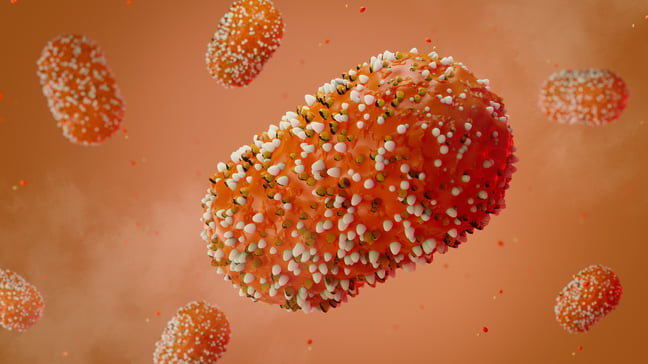
Straight on the heels of a COVID resurgence this summer, US laboratories are bracing for yet another swing in their seemingly ever-changing staffing and resource needs to address new clinical and wastewater testing for human monkeypox virus (hMPXV).
“The unexpectedly quick spread of monkeypox likely means our lab clients may have to invest in new testing,” says Robert Benz, marketing manager for HORIZON, a Clinisys Group company. “This comes at a time, though, when management and staff at clinical labs are still stressed and burnt out from COVID. Now our wastewater lab clients may start to feel that same strain from the potential new demands of validating diagnostic testing for the virus in wastewater.”
Fast Response Needed from Wastewater Labs to Slow Aggressive Spread
The only wastewater lab in the country testing for monkeypox, Stanford University’s Sewer Coronavirus Alert Network (SCAN), has detected the virus in samples from eight of its 10 participating San Francisco Bay Area sewersheds. “We expect to see more of our wastewater and molecular testing clients add monkeypox to their testing assays,” says Benz. “We think the rapid spread of the virus will spur demand for disease prevalence testing in other communities.”
While HHS has rapidly expanded US clinical testing capacity and confirmed the distribution of vaccines to states, there have been 11,177 monkeypox cases (0 deaths) to date in 2022 in the US and over 31,799 cases across 83 countries that have not historically reported monkeypox, according to the CDC as of Aug. 12.
As news of the 2022 hMPXV outbreak unfolds, the following milestones illustrate the fast pace at which laboratories need to mobilize for the aggressive spread of monkeypox:
- May 6: First confirmed case in the U.K.
- June 22: HHS announced it would boost U.S. testing capacity by enlisting five commercial laboratories, including the nation’s major reference laboratories and manufacturers to implement the CDC test
- July 11: CDC announced Aegis Science, Labcorp, Mayo Clinic Laboratories, and Quest Diagnostics to begin testing
- July 23: WHO declared hMPXV a public health emergency of international concern, a crisis alert level previously held only by coronavirus and polio
- August 4: HHS declared hMPXV a U.S. public health emergency
Research Remains Ongoing
Despite the high WHO crisis alert level and U.S. diagnostic readiness, Mayo Clinic Laboratories reported on July 28 to have received only 45 specimens since starting hMPXV testing on July 11. Meanwhile, epidemiologists are studying the unusually quick human-to-human spread of the virus outside of the seven historically endemic regions in tropical West and Central Africa, where the first human case was recorded in the Democratic Republic of Congo in 1970.
Researchers are also studying the mutations specific to the current global hMPXV outbreak clade, which may help explain the new prevalence of sexual transmission and its frequent atypical presentation of skin rash in the absence of other general illness symptoms.
ApolloLIMS Supports Monkeypox Testing
ApolloLIMS is committed to transforming the future of global health with laboratory informatics solutions. By joining Clinisys Group our expertise now extends to a wide range of laboratories, including environmental, water, wastewater, quality testing, and agriculture. And we have a robust set of capabilities to support these labs as they lead research and testing around monkeypox.
Visit Clinisys.com for more information about our LIMS, and outbreak management and disease surveillance data management solutions.